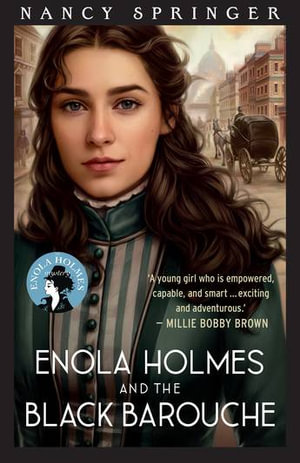Enola Holmes and the black barouche by Nancy Springer

A Netflix sensation, Enola Holmes has been the hero of six novels, and the seventh, Enola Holmes and the black barouche has now been published. In this exciting novel, Enola chases down a man she believes to be a murderer, the Earl of Dunhench, the husband of her friend's sister, Felicity, who has died in the most unusual of circumstances. Not only was the death certificate signed by Dr J Watson, who refutes this, the sister, Letitia, only received a short note from the Earl about Felicity’s death.
Letitia hires Enola to look into the situation, especially as his first wife had died in similarly strange circumstances. She goes to the village where he lives, cleverly asking questions of the locals but being a single woman she is not allowed to stay in the village inn, so she goes to his hall where she uses her guile to stay overnight, questioning the servants further as they dress her for dinner. Enola is a convincing fascinating character, who espouses twentieth century ideas while having to live by nineteenth century morals and customs. The comparison is enticing as she describes the way people live around her. The excitement of the hunt for the murderer is equally as interesting as the background information Springer includes in her tale. We see the disparity between rich and poor, the easy power of the upper classes, able to control people in their employ, the condition of the roads and transport, the difficulty of travel and the restriction that women’s clothes brings.
The first in the series, Enola Holmes and the missing marquess was followed by five more by Nancy Springer, now grouped together as the Enola Holmes mysteries. The seventh, Enola Holmes and the black barouche is now followed by an eighth incarnation. The first, Enola Holmes and the missing marquess, was made into a film by Netflix and so well received that a second is in production.
The books are full of adventure with an enticing main character, smarting against the restrictions society at the time impose on women. She is much more modern than the times, and with hints of the Suffragette Movement in the background along with the way women are treated, gives food for thought for the more mature readers.
Themes: Sherlock Holmes, Nineteenth century England, Mystery, Humour.
Fran Knight